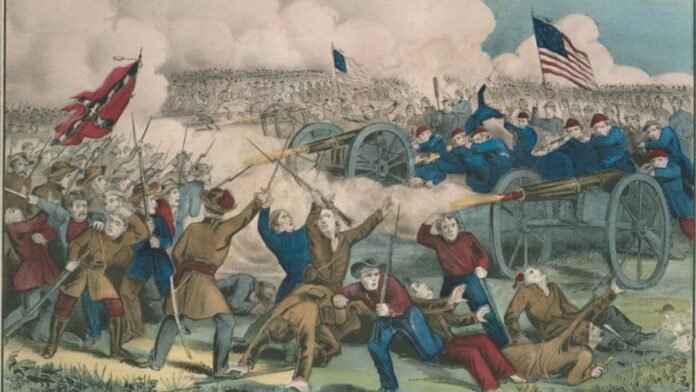The Battle of Gettysburg, considered to be one of the most important battles of the American Civil War, came to an end on July 3, 1863. Fought for over three days, the battle marks a turning point in the history of America. On this day in 1971, singing legend Jim Morrison was found dead in a bathtub of his Paris home
read more
One of the largest and bloodiest battles to have been fought on of the American soil – the Battle of Gettysburg came to an end on July 3, 1863. It was fought for over three days in and around the town of Gettysburg, Pennsylvania and marked a turning point in the American Civil War.
If you are a history geek who loves to learn about important events from the past, Firstpost Explainers’ ongoing series,
History Today, will be your one-stop destination to explore key events.
Jim Morrison, the legendary frontman of the rock band The Doors, was found dead in Paris, France, on this day in 1971.
Here is all that took place on this day across the world.
The Battle of Gettysburg drew to an end
It was the third day of the Battle of Gettysburg on July 3, 1863, which became the last attempt of Confederate General Robert E Lee to break the Union Army led by Major General George G. Meade. It was a disastrous attempt that ended in failure, thus bringing the most decisive battle of the American Civil War to an end.
The battle began when Confederate forces encountered Union troops unexpectedly, leading to intense fighting that quickly escalated. On July 2, both sides engaged in brutal combat at key locations like Little Round Top, Culp’s Hill and the Peach Orchard. By July 3, Lee launched his most ambitious and ill-fated assault, Pickett’s Charge, a massive infantry attack on the Union centre at Cemetery Ridge.
Pickett’s Charge failed disastrously, resulting in heavy Confederate casualties and forcing Lee to retreat to Virginia. With over 51,000 soldiers killed, wounded or missing, Gettysburg was the costliest battle in American history. The Union victory ended Lee’s attempt to invade the North and boosted Northern morale, shifting the momentum of the war in favour of the Union.
The battle’s end also paved the way for
President Abraham Lincoln’s Gettysburg Address, delivered a few months later in November 1863 at the dedication of the Soldiers’ National Cemetery. His words redefined the purpose of the war as a struggle not just for the Union, but for the principle of equality and freedom.
Jim Morrison death in 1971
Legendary performer and singer
Jim Morrison was found dead in a bathtub in his apartment in Paris on July 3, 1971. Morrison was a member of the rock band The Doors. His untimely passing quickly became one of rock music’s most enduring mysteries, fuelling numerous conspiracy theories due to the lack of an official autopsy.
Morrison had moved to Paris in March 1971 with his longtime girlfriend, Pamela Courson, taking a break from The Doors and the pressures of fame to focus on his poetry. According to Courson’s account, Morrison woke up feeling ill in the early hours of July 3 and took a bath. She later found him unresponsive. The official cause of death was listed as heart failure by French authorities, who did not deem an autopsy necessary under local law.
However, the absence of a formal examination has led to decades of speculation. Various unofficial accounts and theories have emerged, including claims that he died of a heroin overdose at a Parisian nightclub, the Rock ’n’ Roll Circus, and his body was subsequently moved to the apartment to avoid a scandal. Some even suggest he faked his own death to escape the limelight.
Known for his deep, poetic lyrics, magnetic stage presence and rebellious spirit, Morrison was a cultural icon of the 1960s counterculture. With The Doors, he created timeless hits like Light My Fire, Riders on the Storm, The End and People Are Strange. His work pushed boundaries and challenged societal norms, earning him both admiration and controversy. The singer was buried in Père Lachaise Cemetery in Paris, a resting place for many famous artists and writers. His grave has since become a pilgrimage site for fans around the world.
This Day, That Year
-
Egyptian President Mohamed Morsi was removed from office by a military action in 2013.
-
The US House of Representatives voted to admit Kansas to statehood under the antislavery resolution known as the Topeka Constitution on this day in 1856.
-
In 1608, Samuel de Champlain founded the city of Quebec.






